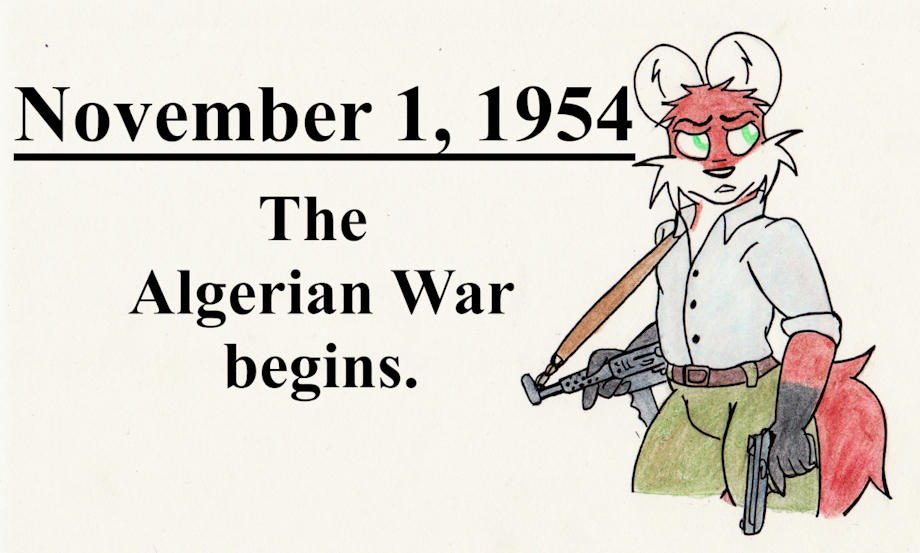On November 1, 1954, the Algerian War (also known as the Algerian War of Independence or the Algerian Revolution) begins. Early in the morning, Algerian nationalists of the National Liberation Front (Front de libération nationale, or FLN) wanting an end to French rule launched multiple attacks against police and military targets. As the FLN gained support in Algeria's rural areas, many French and European farmers sold their lands and moved to the relative safety of the cities, fearing possible attacks and reprisals by the Algerian revolutionary force. In 1956, the war had escalated to include civilian targets following the massacre during the Battle of Philippeville where FLN-aligned forces murdered over 150 French and Muslim civilians, including children, and hundreds more Muslims were massacred by French military and colonists alike.
By 1958, the war in Algeria had led to political crisis in France. To many in France, Algeria was beginning to look like another Indochina (Vietnam) where France would be compelled to withdraw following a long, bloody, and costly conflict. For some, including many in the French military, the only hope at salvaging the situation in Algeria for the French lay in electing Charles de Gaulle as president. To this extent, French paratroopers stationed in Algeria staged a bloodless invasion of Corsica with an invasion of mainland France and seizure of Paris itself planned should de Gaulle not be approved by the French parliament. Such operation was canceled when de Gaulle was officially approved as the president just hours before the operation was set to begin. This also marked the end of the French Fourth Republic, which was soon officially dissolved and replaced by the Fifth Republic which stands to this day.
Due to the cost of the war, the amount of military manpower (nearly half of the French army) tied down in the conflict, growing opposition to the war in France, and growing support for Algerian independence among other issues led de Gaulle to voice support for self-determination. In reaction, the Organisation Armée Secrète (Secret Army Organization, or OAS) was formed and began a campaign of terrorism to prevent Algerian independence, including assassinations in both Algeria and France. In 1961, an attempted coup d'etat by a small number of French generals failed to achieve its goal of forcing de Gaulle and France to end talks with the FLN and instead continue to reassert control over Algeria. In March 1962, the Évian Accords ended the war by granting Algeria full independence.
Following Algerian independence, a mass exodus of Europeans as well as indigenous Jews overwhelmed France. 900,000 fled France in the months following the end of the war, fearing persecution and violence. A further 90,000 indigenous Algerian Muslims who had served as auxiliaries in the French army, known as Harkis, also fled to avoid such violence and persecution. Of those who chose to remain in Algeria, an estimate of 50,000 to 150,000 Harkis and family members were labeled as traitors and murdered by the FLN and lynch mobs. Approximately 140,000-150,000 FLN personnel and 25,600 French troops were killed in the war and a further 50,000 Harkis were killed or missing. Two million Algerians were displaced and/or resettled as a result of the war.
Keywords
male
1,244,786,
fox
257,092,
vulpine
37,753,
this day in history
248,
tdih
244,
france
208,
algeria
1,
november 1
1,
algerian war
1,
algerian war of independence
1,
algerian revolution
1
Details
Published:
6 years ago
02 Nov 2019 03:12 CET
Initial: c75c1aca0af6b5e7b02b717706df7c68
Full Size: 62df86428c187c23b690a7ec4f50e72e
Large: 4aebeca3f747ac0bd184edf3ee3da96e
Small: d28b745838db321609768424896ed967
Stats
28 views
5 favorites
0 comments
